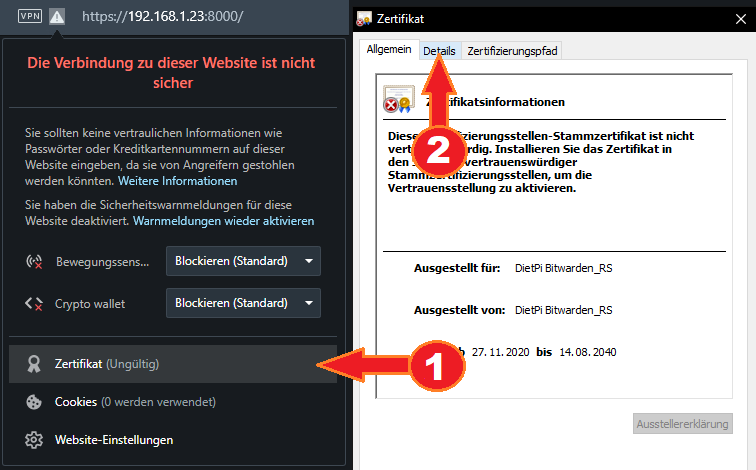Both Bitwarden and Passbolt are open source password managers specifically built for teams. This article will help you decide which one suits you better.
Bitwarden Local Network Only
It works so far. I can only access Bitwarden in my local network. But now comes the tricky part: I don't have a static ip address. This means after 24h my ip changes and I can't access Bitwarden neither over local network nor outside my network. And putting in my purchased domain name instead of my current public ip is not offered as far as I know. The recommended approach for exposing Bitwarden outside of your local network is by using a reverse proxy. In this tutorial, I will be using Nginx Proxy Manager which will be hosted on the same Raspberry Pi. If you’d like to use Nginx Proxy Manager, you can learn how to set it up here. Firewalls (like iptables) can only block the IP which is sending the actual request to where fail2ban is running. So if you have a construction like this: router - reverse-proxy - bitwardenrs-host what will happen is that the bitwardenrs-host only sees the IP from the reverse-proxy on a network level. This user is only needed by Home Assistant. Since we have a local Bitwarden installation I recommend setting the user id / e-mail address to: homeassistant@localhost.lan indicating this is a local user only.

When it comes to finding a password manager that not only works for individual use but allows teams and enterprises better manage and access sensitive information, finding the right password manager can help ease the work flow. Bitwarden and Passbolt are both open source password manager software, that have been specifically designed for teams and allows businesses to host the applications locally or on the cloud. We will cover following topics in this post in order to compare Bitwarden vs Passbolt:

What is Bitwarden?

Bitwarden is a promising open source password manager that has cross platform compatibility including a mobile and web application along with command line interface as well. You can also access Bitwarden on your desktop as it has compatibility with Windows, MacOS, and Linux. As an open source password manager, Bitwarden can be used for individual use as well as at enterprise level. Not only can you host Bitwarden on your servers but it has cloud hosting as well, and with cross device compatibility it can be accessed whenever you need.
Bitwarden Local Only Internet

What is Passbolt?
Passbolt is an open source password manager specifically developed for businesses. The interface has been designed keeping in mind the needs and requirements of small and large team, and it allows an easy and secure management of passwords and sensitive information that needs to be accessed by multiple employees regularly. Passbolt is only available to be used locally on your server and can be accessed through a web browser extension online. As an open source password manager, you can directly install the source code on your server, or host it on Ubuntu, CentOS 7, Digital Ocean and more.
Main Differences
Both Bitwarden and Passbolt provide many features and functionality as open source managers, however they differ in their encryption technique and different client side applications they offer. Here is a rundown:
- Bitwarden provides mobile, web and desktop applications for their users to access passwords at any time. However, Passbolt only provides local hosting for client servers and web browser extensions in order to access passwords online.
- Passbolt has been specifically designed for teams which means that the interface provides a better user experience and overall community benefits that come along with it. Bitwarden on the other hand can be used for both individual and team use.
- When it comes to pricing both open source password managers provide free and premium packages. While Passbolt it free to use for unlimited users, Bitwarden only allows two users on their free plan.
- Encryption is key difference when comparing Passbolt and Bitwarden as the former uses GnuPG algorithm to authenticate users and secure the password database. On the other hand, Bitwarden uses 256 bit AES encryption protocol. Both encryption technologies ensure maximum security and protection of information stored.
- Only Passbolt provides users and group management feature on its free package which makes it easier for teams to categorize and provide a hierarchy to access passwords. Bitwarden has these features but you will have to purchase the plan for Team organization.
- Passbolt has an open API that can be accessed for development purposes however, Bitwarden’s API can only be accessed in its premium package.
Conclusion
In this post, we tried to go over in detail comparison of Bitwarden vs Passbolt. We discussed the main differences between the two open source password managers and which one provides the most features as a free, easy to use, open source password manager for teams.
Explore
Bitwarden Local Only Access
You may find following links relevant:
